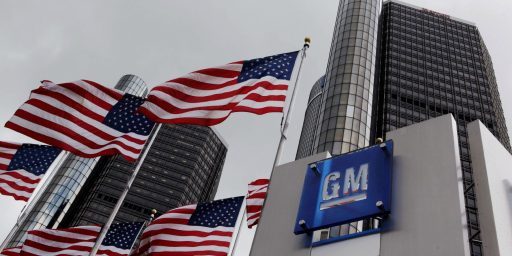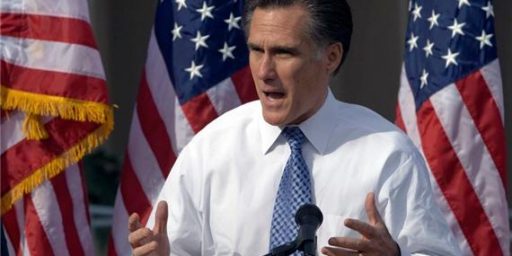Bailing Out the Auto Industry
No matter what your politics are, left or right, I think we can all agree that bailing out the U.S. auto industry is a bad idea. As Conor Friedersdorf notes
When an auto firm makes a product inferior to its competitors, signs labor contracts it cannot afford, and focuses its fleet on gas guzzling SUVs at a time of rising gas prices and increased environmental awareness, do you know what that firm and its shareholders deserve? Bankruptcy! At the very least, the American taxpayer shouldn’t be asked to bailout firm executives who managed their business poorly, shareholders who allowed them to do so, and a workforce represented by a union that pushed for an obviously unsustainable labor contract.
I agree with this wholeheartedly. The bankruptcy courts can handle this kind of thing. The only possible use of taxpayer dollars that might be justified here is to help out pensioners who are impacted by the auto industry’s mismanagement. I don’t see much of a case for doing much else. Bailing out an industry that, in all likelihood can’t pay off its loans is likely to lead, as Michael O’Hare notes, to a government-run car company.
But these companies have amply demonstrated that their management is pretty good at making twentieth century cars in a protected environment, but profoundly suck at everything since except, well, sucking up taxpayer money and destroying value. Why in the world would one prop up such an enterprise; if it’s a loan, why would one expect it to ever be paid back? We will wind up with a nationalized car manufacturer, and if you like Alitalia, you’ll love US National Motors, a basket case for the ages.
That’s about right.






The thing is, though, that these companies represent a very influential part of US economic activity; I’ve heard that one in seven US jobs is indirectly (or directly) connected to the US auto industry. In a real sense, like some of the banking industry, they’re holding the US economy hostage; they’re “too big to fail.”
It wouldn’t end with just those car companies. One of the reasons why foreign companies will build car plants here in the US is because of a combination of laws and political pressure from the domestic car industry that forces them into doing so in spite of greater efficiency from simply assembling the cars back in their respective home countries. Add those jobs (probably) on to the jobs lost from the Big Three.
I’m not saying there doesn’t need to be reform from the Big Three. But you need to be careful with this.
On the other hand, I think the idea of bailing out an “industry” is mostly based on the fears of the industry itself. If they’re not competent to keep themselves solvent without government intervention, it doesn’t make sense to me that we should bail them out for not knowing how to run their business.
Sure, there may be some pain as we make the transition from idiots to people who actually know how to run their business, but I believe we’ll be better off in the long run.
Government bailouts are “quick fixes,” which, IMHO, are 100% guaranteed to be the wrong answer.
I am not a fan at all of bailing out companies. I think it is a huge mistake. Running a company comes with risks. I do not think the Federal government with money from the US taxpayer should be protecting companies from risks.
The government just needs to say “no” and if a company fails, it fails. I think with the auto industry a huge part of the problem is the UAW.
If the taxpayers are going to bail out the auto industry then let’s bust the unions or force a pay cut – the union workers make ridiculous amounts of money for their 40 hours plus amazing health care benefits – hence one of the main reasons for the bailouts, the US auto makers can’t compete – compare the plants in Michigan with those in say SC where honda has a large plant and profits. Even if Ford/GM can figure out how to create the correct type of car for the market, a bailout is just delaying the inevitable if the workers continue with their bloated paychecks.
My guess would be that the majority of Americans do support a “bailout” even if I don’t. The best hope in that circumstance is for a weak, ineffective, and cheap “bailout.”
Any polls on this?
BTW, you know that National Health would do more to balance the Automotive balance sheets, and reduce retiree obligations?
There is some number of dollars “in” every car to pay health care, and it’s supposed to be one reason Detroit is trapped into making big and high-ticket SUVs rather than smaller, cheaper, more efficient cars.
Calling it a “bailout” is the first mistake. If we are simply enabling them to continue their mismanagement only to wind up in the same sport a year or two from now, it isn’t a bailout, it’s delaying the inevitable. We don’t have any spare good money to throw after bad.
Honda also makes cars in MI what is your point?
You may have heard it but that doesn’t necessarily make it true. Can you offer some support for the claim? The most recent repetition of that claim I’ve heard is from John Dingell and he doesn’t offer any more support for it than you do.
The problem is that over the last 25 years the domestic auto companies have cut their payrolls roughly in half and many of the parts that used to be made here are now made overseas. The Detroit automakers just aren’t as important as they used to be. People who work for auto dealers, auto mechanics, and other service jobs shouldn’t count into the total because even if GM and Ford collapse completely many of those jobs will remain. Losing the Detroit automakers is not synonymous with losing all domestic jobs connected to the auto industry.
Hyundai has dealers, too, and local people are employed working on Subarus as well as on Chevies.
BTW, Alex, did you see my post on this subject from over the weekend? I dealt mostly with the employment side of the issue.
The real issue here is the unions.
Leaving aside for the moment, the issue of the companies falling, which most Democrats won’t mind much… after all corporate America is something to be diminished… the bailout is both caused by union excess, and to reindforce it.
Imagine, what happens to union power, when GM Ford and Chrysler fold? They haven’t exactly been accepted with open arms… wo where would they go?
I think bailing them out would just feed the general cynicism caused by the bank bailouts. Privatize profit, socialize risk is getting to be a very common and cynical saying even among political moderates.
I suspect it’ll happen though. The democrats will want to give handouts to the unions, the republicans to the executives – so long as there’s welfare for both union and execs both parties will be on board. When push comes to shove, neither party shows any interest in free enterprise.
The triple bailout for AIG might be a bigger hot-button if more people knew about it. It’s up to $150B now. (You might find some common cause with Mark Thoma in deploring it.)
So what is a Detroit bailout going to look like, relative to the banks and AIG? In this environment I’d say if it’s less than $50B it’s chump-change, and we don’t have to waste time on it.
We have bigger problems. (See also The Big Picture on tax breaks granted unconstitutionally by the Treasury Department.)
I have a sneaking suspicion that there are no capitalists in the wild, only in captivity, say, in think tanks and the blogosphere.
We have no real leadership that will let these big companies fail, period. Too big to fail only applies to corporations and not the middle class, of course. The GOP certainly would take a hit if they threatened to lose jobs – Joe the plumber and Joe the car maker would take a huge hit if those factories dried up and jobs went overseas.
If Obama’s first choice was to let the automakers go under, that’d stain his entire presidency, before his first day in office.
No, no one is going to risk this. No politician really believes in small govt, in the free market.
HOw can you socialize the risk and privatize the profits in Washington, and still claim to support the market? You can’t. Just keep buying votes.
But bailing out the financial industry…no problem. Who cares if it sends a signal, “Go ahead and screw up, but make sure it is big so we can bail you out.” Never mind that it doesn’t address any of the problems that caused the crisis.
The inconsistency is…amusing.
Steve,
My support for the financial sector was based on a grudging admission that there didn’t seem to be a better solution than buying assets that are currently unpriceable so banks would have a better picture of their solvency.
Now that the bailout has evolved into “recapitalization”, it no longer has my support.
Well, I think it was obvious what was going to happen with the bailout. Make a deal with the Devil and you have only yourself to blame for the bad outcome.
Probably the most sound logic I’ve seen in this topic. I’m sure we can all agree that we’ve been bailing out failing businesses since 9/12/2001.
When the airlines started to fall, if there was any hope for this nation at all, the government would have said no the first time.
But after turning the airlines into a pseudo-government-taxpayerpaid-entity, I think all corporations looked at that as “what can I get from the government too”.
Because now that banks, car makers, and any other large failing company sees YOU AND ME and an endless supply of money, this won’t end soon.
Crooked elections, crooked politicians, crooked CEO’s, ….
After the oil crisis in the 1970s, the American auto industry pleated that it “needed time to grow strong enough to compete with the imports on the free market†and the Reagan Administration agreed to limit auto imports. The auto industry did not respond with the promised development of more fuel-efficient cars but merely increased its price an average $2,600 per new car and achieved record profits while selling fewer cars than in their record sales year in 1977! (Hudgins, Edward, 1985, The Heritage foundation, The costly Truth About Auto Import Quotas, http://www.heritage.org/research/energyandenvironment/EM74.cfm). This incident indicates that governments have to be more critical prior to interfering as they cannot only hurt consumers but can also ruin international relations with import restrictions.
Despite of this fact that we got screwed, I believe that our politicians in Washington will bailout the American Auto Industries. Why you asked? Because they already sent their lobbyists carrying bags full of money up capitol hill and deposited into those politicians’ campaign contribution funds.